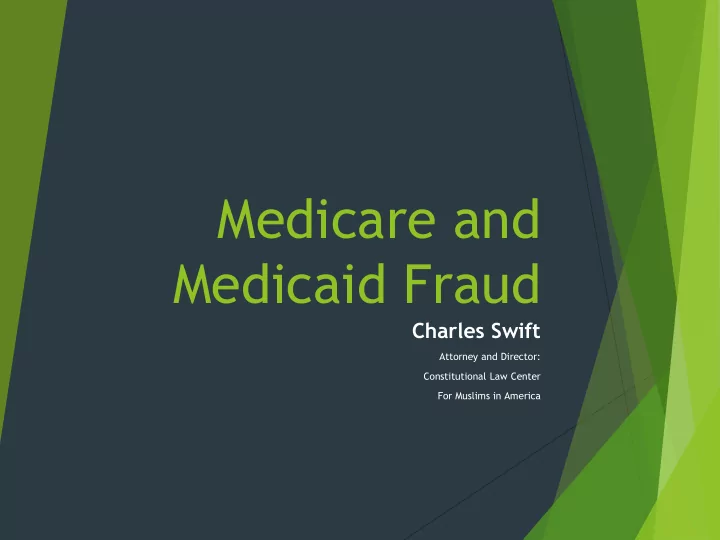

Medicare and Medicaid Fraud Charles Swift Attorney and Director: Constitutional Law Center For Muslims in America
Medicare Fraud Various groups estimate that the government overpays 8% to 10% annually in Medicare and Medicare reimbursements For Medicare alone, that is more than $50 billion dollars
Medicare Strike Force The Affordable Care Act of 2009 provides an additional $350 million to pursue physicians who are involved in both intentional and unintentional Medicare fraud through inappropriate billing The Strike Force is composed of agents from the Office of Inspector General for the U.S. Department of Health and Human Services and agents from the FBI
Prosecutions Have Steadily Grown In 2015, 243 people, including 46 doctors, nurses, and other medical professionals, were prosecuted for $712 million in false billings. The Opioid Epidemic has only increased pressure for prosecutions In April 2018, AG Sessions reiterated emphasis on Medicare and Medicaid fraud prosecutions
Criminal and Civil Statues The Health Care Fraud Statute; The Anti-Kickback Statute; and The False Claims Act;
18 U.S. Code § 1347 - Health care fraud Whoever knowingly and willfully executes, or attempts to execute, a scheme or artifice — (1) to defraud any health care benefit program; or (2) to obtain, by means of false or fraudulent pretenses, representations, or promises, any of the money or property owned by, or under the custody or control of, any health care benefit program, shall be fined under this title or imprisoned not more than 10 years, or both.
42 U.S.C. § 1320a-7b. Anti- Kickback Prohibits the exchange (or offer to exchange), of anything of value, in an effort to induce (or reward) the referral of federal health care program business. Punishable by up to five years in prison.
31 U.S.C. § 3729 - FALSE CLAIMS ACT (AKA the " Lincoln Law ") imposes liability on persons and companies which defraud governmental programs. Primary civil litigation tool in combating Medicare and Medicaid fraud. Includes a qui tam provision that allows people who are not affiliated with the government to file actions for 15 – 25 percent of recovered damages. $7.7 billion in 2016
Types Of Medicare Fraud Phantom Billing Patient Billing Durable Products Fraud Upcoding
Phantom billing: The medical provider bills Medicare or Medicaid for procedures or tests that were never performed; for unnecessary medical tests or tests never performed. Fictitious Patient: Provider submits billing information for non-existent patients that have been created within the Medicare or Medicaid system. Kickback Patient: Patient is part of the fraud and provides his or her Medicare/ Medicaid number and agrees to falsify receipt of treatment in exchange for kickbacks.
Patient Billing A patient who is in on the scam provides his or her Medicare number in exchange for kickbacks. The provider bills Medicare for any reason and the patient is told to admit that he or she indeed and received the medical treatment.
Durable products fraud Provider bills for unnecessary equipment; or Equipment that is billed as new but is, in fact, used.
Upcoding Upcoding refers to a practice in which a provider bills a health insurance Medicaid/ Medicare/or a private insure using a CPT code for a more expensive service than was performed.
Fraud Triangle Pressure Financial or Emotional force encouraging fraud Opportunity Rationalization Ability to execute fraud Justification for without being immediately dishonest acts detected
Avoiding Problems Know Medicare and Medicaid billings requirements Know what you are signing Only accept payment for service preformed
Recommend
More recommend